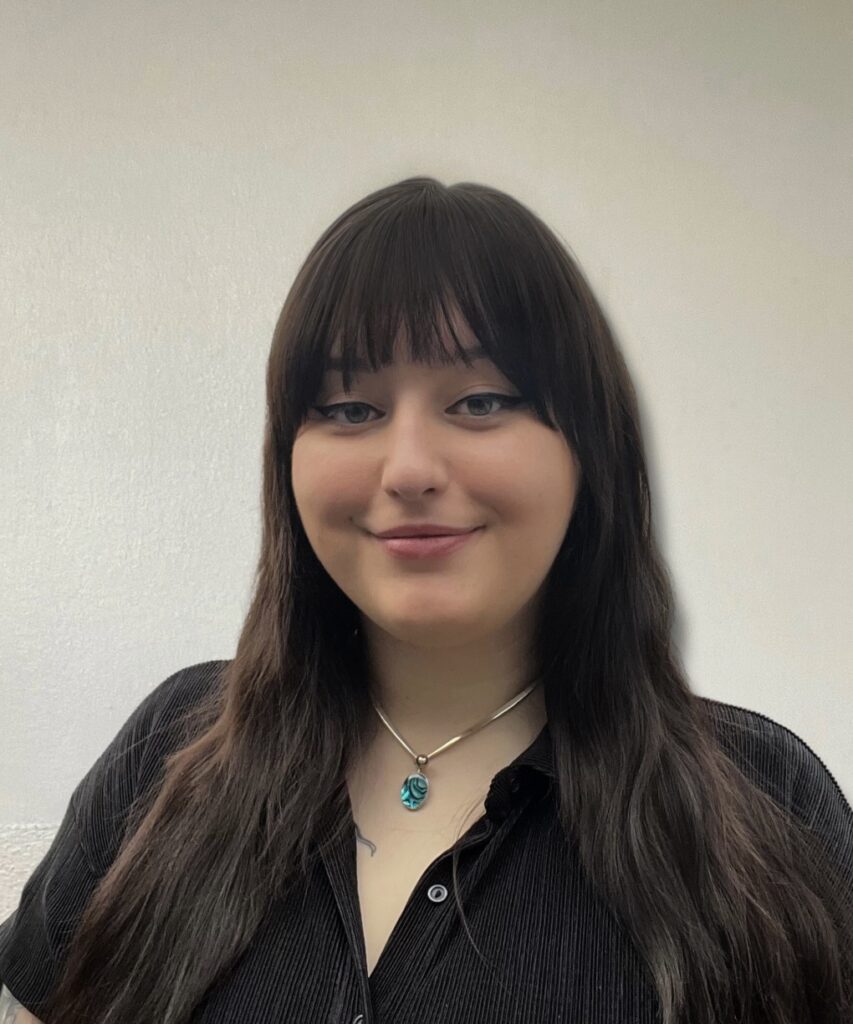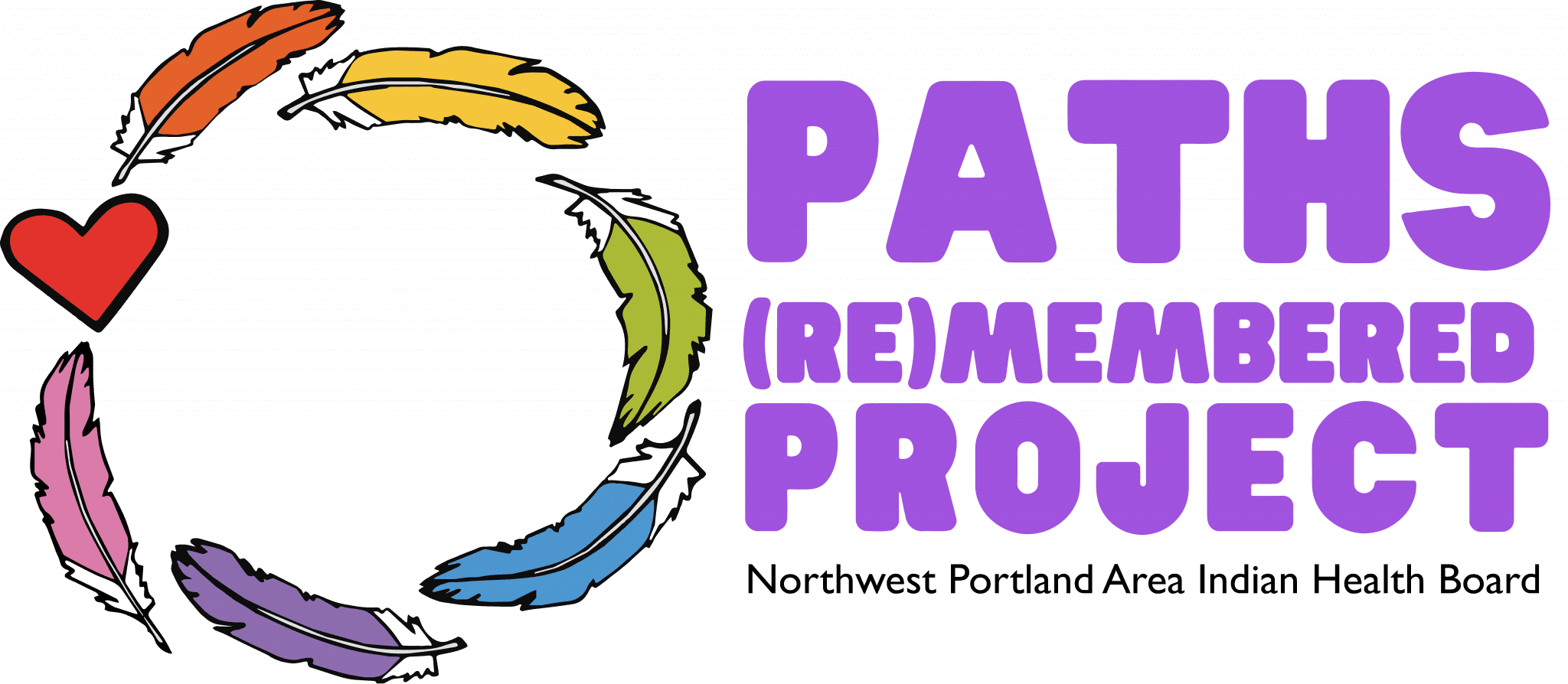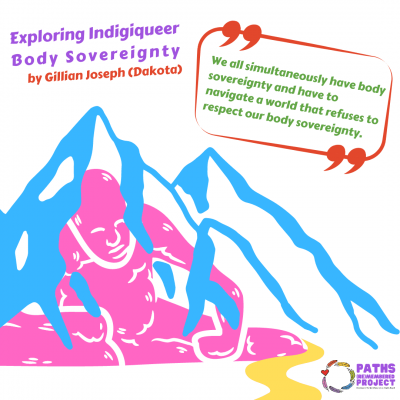What is Body Sovereignty?
You may have heard the term body sovereignty before, especially in conversations about Indigenous communities, 2SLGBTQ+ people, and upholding the right to receive gender-affirming healthcare and access safe abortions. Body sovereignty refers to the right that every person has to be in full control of their body. This means that your body is a space free from other’s decisions, legislation, and ownership. Simply put, you are the authority on your body. Only you can choose how you spend your time, what to wear, how you want to experience pleasure, who you are intimate with, where you go, and what you consume.
But, the reality is that our body sovereignty is not upheld and respected at all times throughout our life. As 2SLGBTQ+ Indigenous people, we face attacks on our body sovereignty by individuals, the government, the legal system, and the healthcare system that can leave us feeling like we don’t have control. Acknowledging this trauma and discovering ways to reclaim our body sovereignty can be healing. Diving deeper into the words “body” and “sovereignty” individually is a useful starting place for this journey into healing.
Taking Time to Think About the Body
When you think about the word body, what is the first thing that comes to mind? Maybe you picture your own body, a body that you believe is ideal, an experience or emotion, a page in a dictionary, related images and words, or a textbook diagram.
I had never spent much time thinking about the word body and what I associated with it until my therapist asked me how I wanted to refer to my physical self. Without pausing to think about her question, I responded, “You mean, my body?” She let me know that I actually didn’t have to use the word body; vessel, being, soma, or physical self are examples of terms that people prefer to use. There’s plenty of reasons we might choose to use words other than body. For some of us, the word body could be connected to trauma, dysphoria, and pain. We could also feel that our experiences aren’t represented by the word body, similarly to how colonial concepts of gender don’t include Indigenous gender identities. On the other hand, the word body could resonate because it reminds us of bodies of water, which might capture our fluidity as people who are constantly changing.
Even though it seems like a weird exercise, spending time investigating how we connect with a word like ‘body’ (that often has a lot of emotions, experiences, and imagery tied to it) can make a positive difference in the relationship we have with ourselves. Being intentional about words we use by learning what we like and don’t like helps us get to know ourselves better. To take care of ourselves, we have to figure out our needs and how to best honor them. And, we must have sovereignty over our bodies so that we can do all of these things.
Deepening Our Understanding of Sovereignty
Sovereignty can be defined in many ways and applied to many things. At its core, sovereignty is the authority to make decisions. An example of sovereignty that you’re probably familiar with is tribal sovereignty, which refers to the inherent power that tribes have to govern themselves. In other words, all tribes have the right to make their own decisions, and this right isn’t something that can be given or taken away.
Since there isn’t one definition of sovereignty that is agreed upon, every tribe has to decide what sovereignty means to them. Vine Deloria, a Hunkpapa Lakota ancestor and the author of Custer Died For Your Sins, defined sovereignty as a social and cultural way to establish and protect community. He believed that sovereignty preserves our identities as Indigenous people.
When it comes to body sovereignty, we as individuals also have to decide what it means to us. How I think about and express body sovereignty is similar to Vine Deloria’s definition, even though he was talking about tribal sovereignty. I feel that I have sovereignty over my body when I am able to express my identity as an Indigenous person, a queer person, a 2-Spirit person, and a disabled person without judgment, limitations, or fear. When we experience marginalization because of our identity – meaning that we’re treated as less than – our body sovereignty can come under attack. Just like our tribal nations fight against governments that refuse to recognize tribal sovereignty, we as queer Indigenous people often find ourselves in situations where we have to fight for our body sovereignty to be respected.
Affirming and Reclaiming Our Body Sovereignty
We all simultaneously have body sovereignty and have to navigate a world that refuses to respect our body sovereignty. Our bodies are often political sites that are subjected to laws, criticism, and policing. We aren’t able to have sovereignty when we are told what we can and can’t do with our bodies. At the beginning of this article, I mentioned gender-affirming healthcare and safe abortions as two topics that are connected to body sovereignty. There have been laws passed recently in the United States that restrict our access to these rights and take away options for how we take care of our bodies. This is an example of how our body sovereignty is being denied by others’ decisions.
Being denied body sovereignty can be violent, traumatic, and scary. It’s overwhelming to think about all of the ways that our body sovereignty is being limited. We’re left wondering how we can reclaim our body sovereignty in the face of so much harm. And, there isn’t one easy answer. In the same way that we define what body sovereignty means to ourselves, we also have to explore what reclaiming body sovereignty looks like for ourselves.
I believe that reclaiming our body sovereignty can be done through everyday acts that validate who we are and honor our needs. Some things I do to help me reclaim my body sovereignty include:
- Learning my language. Although I’m a beginner speaker of Dakota, spending time learning the language that my ancestors spoke connects me to them and feels empowering. When I’m learning Dakota, I’m reminded that there are many ways to recover and carry on our traditions and cultures as Indigenous people, even though they are targeted by colonialism. I am free to explore these options and build relationships with my ancestors and relatives in the ways that I choose.
- Respecting my body’s boundaries. As someone who has a chronic illness, I’ve had to learn how to listen to and respect what my body is telling me, especially when it comes to resting. It can be hard to admit that I need to rest. We live in a world that prioritizes productivity over health, which causes us to push ourselves to meet unreasonable expectations. I know that I can care for myself and my body when I rest without guilt.
- Wearing clothes that I feel comfortable in. For a long time, I dressed to conform to other people’s expectations instead of dressing how I wanted to. Now, I try to choose clothing that prioritizes my comfort and affirms my gender. For me, this can look like wearing baggier clothes, compressive undergarments under shirts, and soft fabrics. I want to acknowledge that for some of us, it’s not always safe or possible to wear the clothes that we feel comfortable in and want to wear. Clothing is only one of many ways we can validate and express ourselves.
- Exploring pleasure with an open mind. A lot of us were taught from a young age that we should be more concerned with other people’s pleasure than our own. Being intentional about making time to explore what brings me pleasure has helped me re-learn what I enjoy. Pleasure doesn’t have to be about sex or intimacy with others. I’ve learned that pleasure can take countless forms, and this has really nurtured the relationship I have with myself.
These are only a few examples of how to reclaim your body sovereignty, and they may or may not resonate. I invite you to spend time thinking about what affirms your body sovereignty. In other words, what helps you realize that you are in control of your body? Consider the everyday things you do that make you feel good. When we feel respected, safe, and comfortable, it’s likely that our body sovereignty is being upheld.
Body Sovereignty Through the Lens of Identity
While we already touched on how identity is connected to body sovereignty, I think it’s a topic that we should spend more time with. Our identity shapes how we perceive the world around us and how we move through it, so it is deeply intertwined with body sovereignty. Throughout this article, you can probably see how my identity impacts my understanding of body sovereignty. Our identity can help us learn more about body sovereignty. And, now that we have established what body sovereignty means and discussed ideas for how we might reclaim it, we can use our identity to help guide us as we continue to explore body sovereignty in the next part of this series.

Gillian Joseph (they/them) is a queer 2-Spirit Ihaŋktoŋwaŋ and Mdewakaŋtoŋ Dakota storyteller who grew up as a guest on Waxhaw and Catawba lands. Alongside writing, they work in the mental health field with a focus on Indigenous sovereignty.


